Can Putting The Wrong Lense On Your Camera Ruin It
So you lot want to get into photography, exercise yous? Y'all've gone ahead and bought your first entry-level DSLR along with i or ii useful lenses. Mayhap you've too watched some YouTube photography channels to learn the basics.
Now you're ready to starting time shooting. But wait!
Before y'all caput out, at that place are several common mistakes that y'all'll desire to avoid if yous want to maximize the lifespan of your DSLR and protect it from damage that could render your investment moot. A footling fleck of caution can go a long way.
one. Exposure to Farthermost Heat
Modernistic DSLRs are built with a wide range of temperatures in mind, but that doesn't hateful you can be careless well-nigh information technology. Excessive rut can wreak havoc on your photographic camera and at that place'due south no reason why that should ever happen considering it'due south easy to prevent.
What happens nether extreme heat? The seals that proceed out dust and moisture can dry out out and the lubrication on moving parts can evaporate. Sometimes you tin can repair this impairment, but sometimes you can't. Backlog heat can also impact your battery.

Never leave your DSLR sitting in direct sunlight. Not only will it heat upwards apace, but if you keep doing information technology too often, the UV rays can warp or deteriorate the body over fourth dimension.
As well, never exit your DSLR in an enclosed space on a hot mean solar day. Even if it's only 90F outside, the inside of a car tin can be 20--thirty degrees hotter depending on the circumstances. You Do NOT desire to expose your photographic camera to that kind of stress.
On a hot solar day, especially when information technology's climbing close to 100F, you should actively take breaks of a few minutes to cool down your gear. If your camera starts to malfunction, shut it off and accept it to a service eye ASAP.
two. Exposure to Condensation
Even if you never shoot in extreme temperature environments, yous still demand to be careful about moving from hot-to-common cold or common cold-to-hot, such as when you enter or leave your home. The big trouble? Condensation.
Condensation forms when moist air is warmer than a particular surface. Yous know how a cup of ice water (cold surface) on a mid-summer mean solar day (warm air) can start to "sweat"? If you aren't careful, the same matter can happen within your DSLR and impairment the imaging sensor.
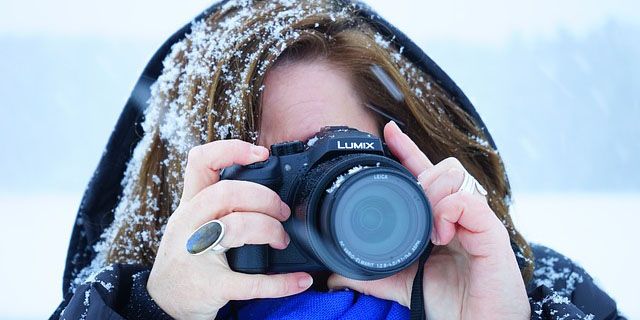
How tin y'all prevent this? Attempt to avoid shooting in overly humid environments when you can. More importantly, never bring a cold photographic camera directly into a warm room.
Instead, y'all should place your camera into a sealable bag -- while y'all're however in the cold -- and so bring it into the warm room. This allows the camera to gradually warm upwardly without any moisture condensing inside it.
Same affair with batteries. Usually y'all'd keep them warm past keeping them close to your body in cold weather, simply don't allow them get too warm otherwise they volition create condensation within. Cool them just a bit before inserting.
three. Exposure to Pelting, Snow, and Water
Every bit with all electronic devices -- including laptops and keyboards -- h2o is ane of the worst things that could get within. Not only can information technology cause rusting if it touches the wrong components, it can crusade a curt and kill the device altogether.
The virtually common mistakes to avoid: rain, snow, spills, and dropping your camera into puddles, pools, etc.
For shooting in rain and snow, try cut a hole in a sealable bag and sticking the lens through. Information technology keeps the body somewhat protected. For full protection, use waterproof housing (expensive). If the atmospheric condition is actually bad, you may only take to postpone for another 24-hour interval.

If your photographic camera contacts h2o, don't freak out but don't hesitate. Speed is of import. As long as you don't run electricity through information technology until information technology's completely dry, it should exist fine.
Every bit shortly your camera gets wet, close it off and immediately remove the battery. Whatever you lot do, do NOT turn it back on -- even out of curiosity "merely to see if it's okay". If your camera turned off on its ain, it may already exist besides late.
In any instance, stick the camera in a sealable bag with a few dehumidifying packets of silica gel and take it direct to a professional camera service center.
4. Exposure to Sand and Grit
If at that place'due south one thing you admittedly Practice Non want getting inside your photographic camera body, information technology's sand and grit. Despite how insignificant a single particle might seem, it can cause a lot of damage when moving parts are involved.
Cosmetically speaking, sand can scratch surfaces and ruin the resale value of your DSLR. But one time it gets inside, it can jam certain components like the shutter. It can as well scratch the battery, which could be dangerous.
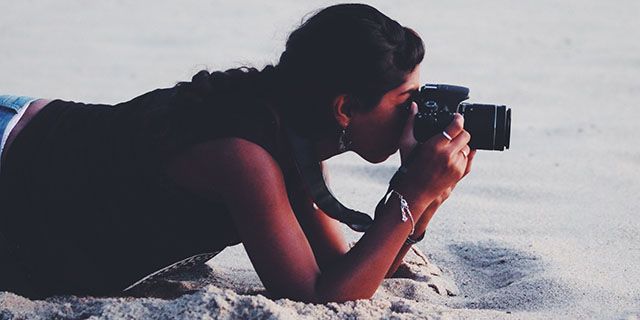
Can you still have your camera to the embankment? Of course, as long every bit you lot're extremely conscientious.
Never modify lenses, switch SD cards, or supervene upon batteries when you're out in the open, especially if it's a windy day. Avoid shooting low to the basis. Use a UV filter to prevent sand from hitting your lens. And in extreme cases, y'all can apply waterproof housing.
If you DO go sand in your DSLR, don't try to make clean it yourself. Take it to a professional photographic camera service middle instead. Sand is serious business organization.
5. Not Wearing a Camera Strap
As a photographer, you wield a device worth hundreds or thousands of dollars right in the palm of your hand. Do you trust yourself to never drop it? Ane fault, i fourth dimension -- that's all it would take. Are you willing to take chances on that?
And I'thousand not just talking about clumsiness, carelessness, laziness, etc. Even the most dexterous and attentive photographer gets tired afterward a long day of shooting, which tin lead to sweaty palms, shaky hands, or a weak grip.
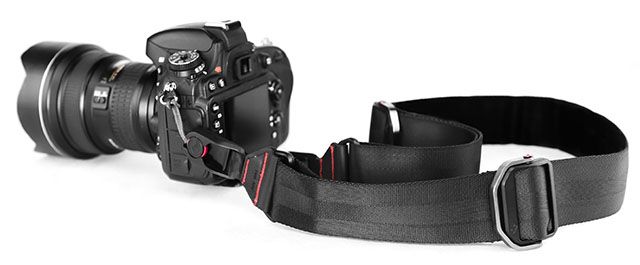
The Peak Design Slide Camera Sling [Cleaved URL Removed] is the perfect balance between toll and quality. The strap itself is robust with aluminum buckles for quick comfort adjustments, but the hooks are flexible enough to exist used in several different means too.
Don't want a cumbersone body strap? Then at least get a wrist strap, like the Height Design Cuff.
Information technology's so of import that we consider it an essential item in every photographer's gear setup. Don't settle for the dinky fiddling strap that came with your Canon or Nikon. A small investment hither tin can prevent a lot of potential damage later.
6. Skimping on Camera Bags
Photography can be an expensive hobby and I know how tempting it tin can be to cut corners hither and there. Trust me when I say that -- cutting corners is my specialty. I've even written about how to be a coin-conscious tech enthusiast, ways to save coin when buying DSLRs, etc.
And if there'south one area where amateur photographers like to cut corners, it'southward in the accessories. Need to salvage as much greenbacks as possible in order to beget that adjacent lens, right? Lenses are the big wallet busters after all.
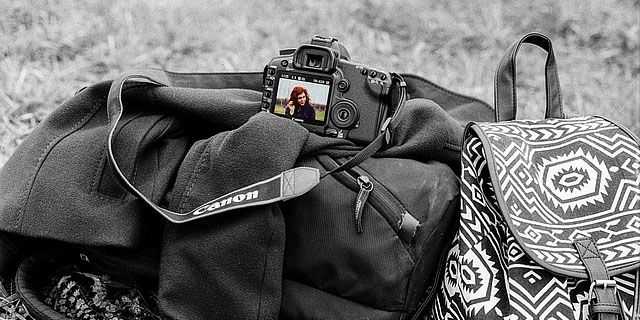
Simply y'all should never cheap out on annihilation that's meant to protect your gear. Maybe you only desire a camera handbag for the convenience gene, but you lot shouldn't forget that your bag is the first line of defense betwixt your gear and the globe.
You lot practice Non want to deal with non-robust straps, plastic joints that could snap under moderate weight, cases that shatter when dropped from the everyman of heights, bags that could split right open, etc. It'south the easiest fashion to accidentally destroy your gear.
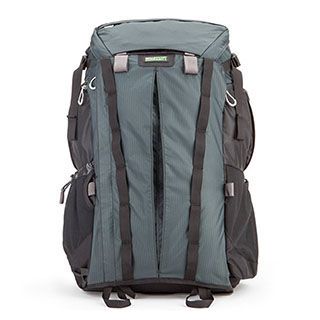
The Mindshift Rotation 180 Backpack is as rugged every bit most amateurs and hobbyists might need. It's big enough to fit several cameras and lenses, it's made of high-quality materials, and it has a belt, a retentiveness foam dorsum panel, a tripod zipper, and a waterproof cover.
A flake pricey? You lot bet. There are cheaper alternatives out there -- no need to spend this much -- but the bespeak is that this thing offers then much more protection than a $20 messenger bag. Don't skimp. You'll regret it.
Got Any Other DSLR Protection Tips?
Now that you know what NOT to do with your make new DSLR, you may likewise want to castor up on mistakes that are draining your DSLR battery. After all, a camera trunk is absolutely useless without a live battery in information technology!
And if yous're a newbie, consider rounding out your knowledge with our guide to buying tripods along with these bang-up YouTube channels for learning photographers.
Hope that helps. If yous have any other DSLR maintenance tips that we missed, delight share them with us in a comment down below. Otherwise, happy shooting!
Epitome Credit: camera lens has been dropped by Anan Kaewkhammul via Shutterstock
Source: https://www.makeuseof.com/tag/6-mistakes-will-ruin-dslr-avoid/
Posted by: valenzuelacountim.blogspot.com

0 Response to "Can Putting The Wrong Lense On Your Camera Ruin It"
Post a Comment